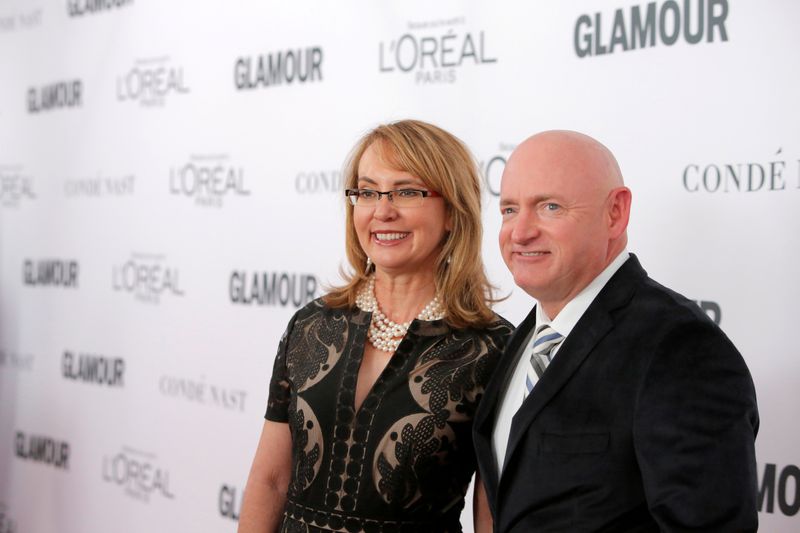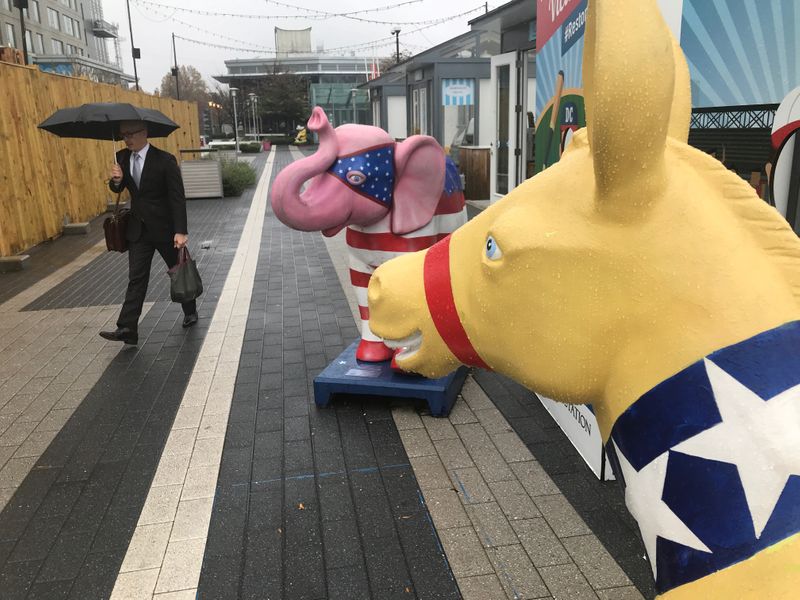By Jason Lange and Amanda Becker
WASHINGTON (Reuters) - Democratic contenders for Republican-held U.S. Senate seats raised more money in early 2020 than their opponents in about half a dozen competitive races, with campaigns amassing cash even as a national health crisis pushed fundraising online.
In six states where Republican senators are widely seen as vulnerable in November elections - Arizona, Colorado, Iowa, Maine, North Carolina and Montana - Democrats raised more money in all but Iowa during the first quarter, according to campaign disclosures filed by Wednesday night's reporting deadline.
Mark Kelly, the Democrat seeking vulnerable Republican Martha McSally's Senate seat in Arizona, netted $11 million in the first quarter, nearly twice the sum raised by McSally. Democratic challenger Sara Gideon raised more than twice as much as Senator Susan Collins of Maine.
Outraising opponents is no guarantee Democrats will win back the Republican-controlled Senate in November elections. This year's election calendar favors Democrats, however, with 23 Republican seats up for grabs compared with 12 Democratic seats. To gain control of the Senate, Democrats need to pick up three seats if the party wins the White House and four if not.
Voter perceptions of President Donald Trump, a Republican whose term could be defined by his response to the novel coronavirus outbreak, could play a role in the fate of his party's Senate candidates.
It's also unclear if the health crisis, which is seen pulling the economy into a deep recession, will depress future fundraising. There was little sign of that in key Senate races in March, the month when measures to fight the coronavirus outbreak halted public events across much of America.
Any slowdown in fundraising could play to the advantage of Republican incumbents. In the competitive races with Republican incumbents, Kelly in Arizona was the only Democratic challenger with more cash in the bank at the end of March than his Republican opponent.
But Democrats' current momentum could be a positive sign for the party's fortunes, with larger war chests helping challengers reach out to voters through ads, phone calls and online.
"It shows that there is an enthusiasm on Democrats’ side," said Jessica Taylor, a political analyst at the nonpartisan Cook Political Report. "The Republicans are not seeing the same enthusiasm when the Senate is very much in play."
Former Colorado Governor John Hickenlooper, who launched a Senate campaign in his state after folding his Democratic presidential bid, raised $4 million in the first quarter, compared with $2.5 million raised by Republican Senator Cory Gardner.
Hickenlooper has run Facebook (NASDAQ:FB) ads asking for money to pay for online campaigning tools needed during the pandemic, which has confined millions of Americans to their homes.
CAREFUL MESSAGING
With the health crisis shutting down much of the U.S. economy, many senators have focused their messaging around their own coronavirus response.
Democrat Gary Peters, a senator for Michigan whose seat is widely considered vulnerable in November, has run Facebook ads promoting legislation to send money to households, while the campaign has raised money for local food banks. Peters' Republican challenger, John James, outraised Peters by nearly a million dollars in the first quarter.
Democrats are also seen fighting an uphill battle to keep Alabama Senator Doug Jones in office. Jones took in $1.7 million in the six weeks through the end of March, about twice that raised by either of his Republican challengers, Jeff Sessions and Thomas Tuberville, according to disclosures released on Wednesday.
Some candidates worry that asking for money in the crisis could look bad.
One incumbent senator's campaign scaled back emails to donors, with many messages only giving guidance on how to stay safe during the crisis.
"We just didn't want to be inappropriate as all of this is going down," an official with the campaign said, adding that the senator was still raising money in video conference calls with donors.
In Iowa, Democrat Theresa Greenfield raised a half million dollars less than Republican Senator Joni Ernst. Some of the money came from a fundraiser in which donors were asked to give $25 to tune into a Zoom conference call that included Greenfield and U.S. Senator Kirsten Gillibrand of New York.
Just over three dozen donors participated, said Patrick Burgwinkle, a spokesman for End Citizens United, a political group that helped organize the fundraiser.
In two other races that some analysts view as competitive, Republican Senator Kelly Loeffler of Georgia took in four times as much money as Democratic challenger Raphael Warnock, but Republican hopefuls for a Senate seat in Kansas held by retiring Republican Senator Pat Roberts were outraised by Democratic candidate Barbara Bollier.

Senate Majority Leader Mitch McConnell of Kentucky, a Republican whose seat is not widely seen as vulnerable, took in about $5 million less than Democratic challenger Amy McGrath.
